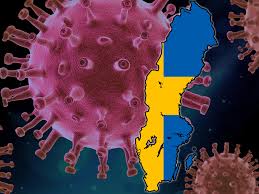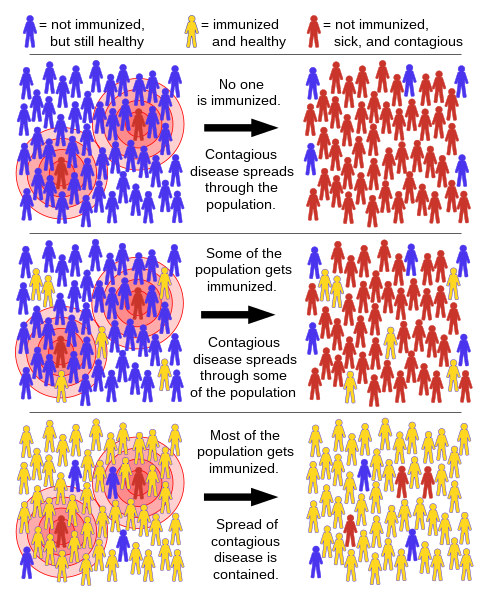
In the past several months, herd immunity is one of the most popular and searched for words. That is the result of the Covid-19 pandemic. Herd immunity commonly known as population immunity is a form of indirect protection from infectious diseases that occurs when a sufficient percentage of the population is immune to the infection.
Today, we will discuss more about the term itself, how can a country achieved it, and what are some examples in history.
As we said before, herd immunity is a situation when a large part of the population or of an area is immune to a specific disease. When enough people are resistant to the cause of the disease, be it a virus or bacteria, it has nowhere to go.
It is important to stress that not every individual is immune. Yet, the group as a whole has protection against the virus. That is because there are fewer high-risk people overall in the group. As a result, the infection rates drop and the disease peters out.
Herd immunity is crucial for the overall health of at-risk populations. Those include babies and people with weak immune systems.
There are two ways a country or an area can achieve herd immunity. We already see one of them in Sweden, a country both praised and criticized for its approach toward the Covid-19 pandemic.
People can develop resistance naturally. This is the approach Sweden takes. When your body is exposed to the virus or bacteria, it creates antibodies to fight off the infection. Once you recover from the disease, your body keeps these antibodies. They help your body defend against another infection. It is worth noting that there are no definite studies showing how long the immunity to Covid-19 lasts.
But this approach helped stop the Zika virus outbreak in Brazil. Just two years after the outbreak, 63% of the population had exposure to the virus.
Another way to create herd immunity is through vaccination. Vaccines build resistance by making your body think there is a virus or bacteria infecting you. We have to stress, you do not get sick. It is just your immune system thinks you are sick and starts making protective antibodies. And the next time your body meets the infection, it is ready to fight it off. Vaccination stopped polio in the United States.
So, when does a community reach herd immunity? There are different numbers and percentages. But the most important number is the reproduction number, or RO. This number tells you the average number of people that a single person with the virus can infect if they are not immune. The higher the RO, the more people need to develop resistance to the virus.
At the moment, research and studies show RO for Covid-19 is between 2 and 3. That means that one person can infect two or three people. For a community to reach herd immunity, they need 50% to 60% to develop resistance to the virus.
With every viral and bacterial infections there are risk groups. These infections spread from one person to another. You break the chain when most people do not get or transmit the infection. The goal is always to protect the people with low immunity. Herd immunity helps prevent spread of the virus to people that are more likely to have fatal implications from the virus. These risk groups are:
For the Covid-19 pandemic, it is widely accepted that people with pulmonary problems in the risk groups. But also patients with diabetes, obese people, patients with cardiovascular problems, and patients that went through chemotherapy recently.
As we said before, herd immunity differs from one bacterial and viral infection to another. For some disease, herd immunity goes into effect when 40% of the people are immune. But in some cases, we need 80% to 90% of the population.
For example, for measles, 19 out of 20 people must have the vaccination for reaching herd immunity. That means that for herd immunity, when a child gets measles, everyone in his surroundings have to be vaccinated or formed antibodies.
That means that no human has been infected with the virus before the pandemic. Another potential barrier is the unknown. We still do not know everything about the virus. There is no study showing a definite immunity towards the virus after getting infected with it. Some estimates are that people develop immunity between 3 to 9 months after getting hit by the virus.
Early research into vaccines shows lasting immunity of several months. And let’s put herd immunity into perspective without vaccination. Let’s say a country has 10 million population. To achieve 40% immunity, that means 4 millions of people have to be affected. Just for visual info, Sweden has 10 million citizens. So far, the country reported close to 90,000 cases. That is far from the 40% herd immunity.
There isn’t a vaccine for Covid-19 yet. And until we get a vaccine, it is hard to imagine reaching herd immunity. And at the moment, with no definite cure, vulnerable members can have fatal implications.
At the moment, there are a couple of research centers working on an effective vaccine for SARS-CoV-2. Once we get a vaccine, we can get herd immunity in the future.
As we saw before, for some illnesses, herd immunity works wonderfully. For example, people in Norway developed partial herd immunity to the H1N1 virus, or the swine flu. They achieved it through vaccination and natural immunity. At the same time, influenza caused fewer deaths in 2010 and 2011 because of herd immunity. But herd immunity doesn’t always guarantee protection.

For example, you can easily contract tetanus from bacteria in your environment. Many of us get tetanus vaccine as child. And when you contract it from bacteria, and not from another person, herd immunity doesn’t work.
Sometimes, people expose themselves intentionally to a virus to achieve immunity. This was the example for the chickenpox. Before the varicella vaccine, people exposed themselves to the less severe disease to get immunity. That might work for less severe diseases. The approach is reasonable. But the corona virus is deadly and more dangerous.
So, if your question is “Should I get the corona virus intentionally”, the answer is definite NO. First off, you don’t get lasting immunity. And second, you might develop severe symptoms. Do not risk it. Protect yourself and wait for the vaccine immunization.

Sperm rates have been declining in Western countries for the past half century. What is causing the trend. Should we be afraid?This documentary explores how items you use every day...
What is pregnancy? It is the time during which one or more offspring develops, or gestates inside a woman’s womb.It is a wonder of the world. Symptoms in pregnancy start at aroun...
We knew it was bad. We didn't know it was this bad. Two months ago, in a joint 60 Minutes, The Sydney Morning Herald and The Age investigation, Adele Ferguson reported on the shock...
In the past several years, air fryers have been trending. Are they worth the buzz? Many believe only if they fit your lifestyle.For example, if you have a large family, it will tak...